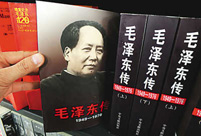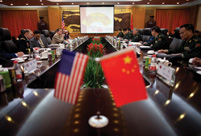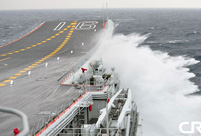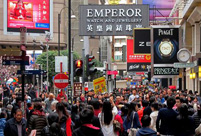 'Jin' named the word of the year by cross-strait netizens
'Jin' named the word of the year by cross-strait netizens Chinese scientific expedition goes to build new Antarctica station
Chinese scientific expedition goes to build new Antarctica station
 Chinese naval escort fleet conducts replenishment in Indian Ocean
Chinese naval escort fleet conducts replenishment in Indian Ocean 17th joint patrol of Mekong River to start
17th joint patrol of Mekong River to start China's moon rover, lander photograph each other
China's moon rover, lander photograph each other Teaming up against polluters
Teaming up against polluters
CAIRO, Dec. 27 -- Chinese Foreign Minister Wang Yi wrapped up a visit to the Middle East on Thursday, in China's efforts to promote peace in the region in the capacity of a responsible big power.
BOOSTING PEACE TALKS
On Dec. 18-20, Wang visited Palestine and Israel separately, the first two legs of his Middle East tour, which also took him to Algeria, Morocco and Saudi Arabia.
He met with Palestinian and Israeli leaders and foreign ministers during his stay, and communicated with people from all walks of life, discussing China's relationship with them and the Palestinian-Israeli peace talks. Wang also illustrated China's four-point proposal to resolve the Palestinian issue, which was put forward by President Xi Jinping in May.
Saying the peace talks have reached a critical juncture, the top Chinese diplomat called on both sides to form consensus and jointly support the peace process. Top leaders of the two sides actively responded to Wang's appeal.
Palestinian President Mahmoud Abbas said his government, looking forward to China's persistent support, would continue to engage in the peace talks with "constructive attitude."
Israeli President Shimon Peres appreciated "China's constructive support" in efforts to bring peace between Israel and the Palestinians.
Invited by the Chinese government, Abbas and Israeli Prime Minister Benjamin Netanyahu paid visits to China nearly at the same time in May.
Also, Wu Sike, China's Special Envoy on the Middle East Issue, visited the region in April and August, demonstrating China's greater sense of responsibility to push forward the peace process.
China is rationalizing and summarizing the positive outcome of the peace talks achieved in the past years to restore the faith of the two sides, Wu said in an exclusive interview with Xinhua in May.
"The visit, featuring friendship, cooperation and peace, achieved its expected goals," Foreign Ministry spokeswoman Hua Chunying said at a regular press briefing while commenting on Wang's Middle East tour.
PROMOTING COOPERATION, CEMENTING FRIENDSHIP
During his visit, Wang also signed a series of agreements with Middle East countries.
Agreeing to deepen cooperation in traditional fields such as trade and infrastructure construction, China and Algeria decided to expand humanistic exchanges and encourage the young generation to inherit the China-Algeria friendship and create a brighter future for bilateral ties.
In Morocco, the two sides signed two agreements on economic and technological cooperation and waiving visa requirements for bearers of diplomatic and service passports of the two countries.
They also agreed to enhance exchanges at various levels, strengthen cooperation in trade, investment and infrastructure construction, and increase communication and coordination on the U.N. Security Council reform, anti-terrorism and other important international affairs to safeguard the legitimate rights of developing countries.
During the last leg of his visit, Wang said mutual political trust between China and Saudi Arabia continues to be strengthened, with pragmatic cooperation in such areas as trade, economy and energy making headway steadily.
He said the two countries have maintained sound communication and coordination in international and regional affairs, adding that Saudi Arabia, a major developing nation in the Arab and Islamic world, is an important strategic partner of China in the Middle East and the Gulf region.
In Riyadh, Wang also met with Gulf Cooperation Council (GCC) General Secretary Abdullateef Al Zayani, underlining China's keenness to promote strategic cooperation and ties in all fields with GCC countries.

 Commemorate 120th birth anniversary of Mao Zedong
Commemorate 120th birth anniversary of Mao Zedong Female soldiers of PLA Marine Corps in training
Female soldiers of PLA Marine Corps in training Chinese cities to have a very grey Christmas as smog persists
Chinese cities to have a very grey Christmas as smog persists China and U.S. - the national image in each other’s eyes
China and U.S. - the national image in each other’s eyes The Liaoning's combat capability tested in sea trial
The Liaoning's combat capability tested in sea trial Chinese pole dancing team show their moves in snow
Chinese pole dancing team show their moves in snow Rime scenery in Mount Huangshan
Rime scenery in Mount Huangshan Ronnie O'Sullivan: My children mean the world to me
Ronnie O'Sullivan: My children mean the world to me Shopping in Hong Kong: a different picture
Shopping in Hong Kong: a different picture SWAT conducts anti-terror raid drill
SWAT conducts anti-terror raid drill AK-47 inventor dies at 94
AK-47 inventor dies at 94 Mother practices Taiji with her son
Mother practices Taiji with her son  Crashed French helicopter salvaged
Crashed French helicopter salvaged Winter travels in Anhui
Winter travels in Anhui  Bird show opens to public in Calcutta, India
Bird show opens to public in Calcutta, IndiaDay|Week|Month